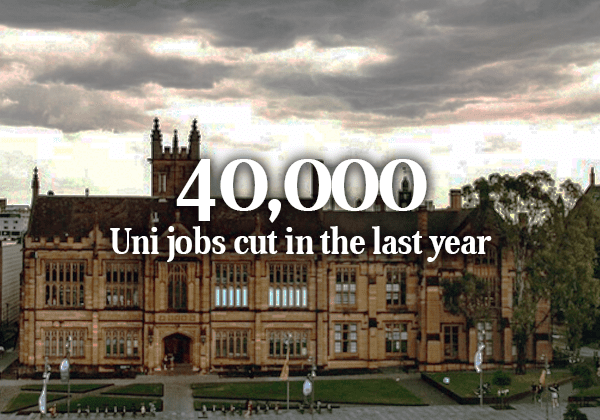Australia’s tertiary education sector has lost 40,000 jobs over the past year, a report by progressive think-tank Centre for Future Work found. Spanning the 12 months to May 2021, 100 percent of job losses occurred in public universities, which account for around three-quarters of total employment in tertiary education.
Casual staff were the first to experience job losses during the early months of the pandemic. The report notes that by the end of 2020, 10,000 casual jobs had been shed, relative to the previous year. This year, it is permanent staff facing the chopping block. By the May quarter, permanent jobs represented 100 per cent of the net job loss compared to year-earlier levels, while universities began to increase their casual hiring again.
These statistics reveal a drastic escalation in the casualisation of university workforces, which denies staff basic job security and entitlements and relies on systemic underpayment. Just yesterday, USyd admitted to wage theft of mostly casual staff totalling $12.75 million, while neighbouring universities have been audited for casual underpayment.
“Without urgent measures to limit casual hiring (including sessional instructors and other casual teaching staff), and protect permanent employment, the scourge of casualisation in Australian universities will clearly get worse in coming years,” the report read.
Additionally, the report found that women have borne a disproportionate share of the job cuts, representing 61 per cent of total losses over the last year. Against a backdrop of women being concentrated in casual positions, experiencing weaker job growth, and shouldering unequal family and caring responsibilities, the gendered impacts of job cuts become especially painful.
At the University of Sydney, a further round of job cuts is imminent in departments such as Studies of Religion, Theatre and Performance Studies. Other universities face similar austerity measures, including proposed job cuts at the University of Technolgy Sydney’s virology department, University of Western Australia’s anthropology and sociology departments, and Macquarie University’s earth and environmental sciences department.
Job losses look likely to continue through the current academic year and beyond, according to the report. As international student enrolments across the sector continue to fall (with the notable exception of USyd), cracks have formed in universities’ financial strategy, which heavily relies on premium fees paid by international students. Before the pandemic, revenue from international student fees had risen to $12 billion in 2019-2020, representing a third of the total revenue base of the university sector.
At the same time, the Federal government has refused to make funding commitments to support universities through the current economic crisis. The report notes that further losses could be prevented by providing an additional $3.75 billion in annual funding to universities until normal teaching and international education can resume. “This may seem expensive, but relative to the scale of support given to other sectors in the economy – and relative to the revenue losses experienced from the Commonwealth’s decision to close borders – it is modest and appropriate,” the report reads. Indeed, the government’s most recent budget tagged total expenses associated with fighting the pandemic at $311 billion.
However, any support under the Liberal government is highly doubtful given the recent reduction in fee contributions to universities and the emphasis on “job-ready” degrees to boost the economy. “None of these job losses were necessary and could have been stopped long ago with simple and prudent government policy,” said USyd SRC President Swapnik Sanagavarapu. “Whether negligently or deliberately, the Government is sacrificing one of Australia’s most important industries and in the process putting an immense amount of people into unemployment and immiseration.”
As the number of university jobs continues to plummet, serious concerns have been raised about the declining quality of education. The Bradley Review of Higher Education in 2008 found that rising student-to-staff ratios jeopardise the quality of teaching provided to students, due to the additional strain placed on staff to manage larger cohorts and extra work. Increasing casualisation will only exacerbate this trend. Additionally, the stress caused by job insecurity and the job dissatisfaction caused by poor career prospects further detracts from the quality of education, according to a recent OECD report.
The report calls upon the government to step up with “extraordinary crisis supports” so that universities can retain staff and ensure the sector survives the pandemic. “Universities clearly need more resources and staff – not less,” it read.
“We need to reject the narrative that these cuts are necessary or that the University has been anything but willing to implement them,” said SRC Education Officer Maddie Clark, encouraging students at the University of Sydney to attend an Education Action Group forum on the Arts Faculty cuts on Wednesday. “They do not have to be pushing through these cuts and by fighting together we can stop them.”
Come along to the Education Action Group’s ‘Stop the Cuts to Arts’ online forum a 6 pm on Wednesday 15 September. You can find more details about the event here.





